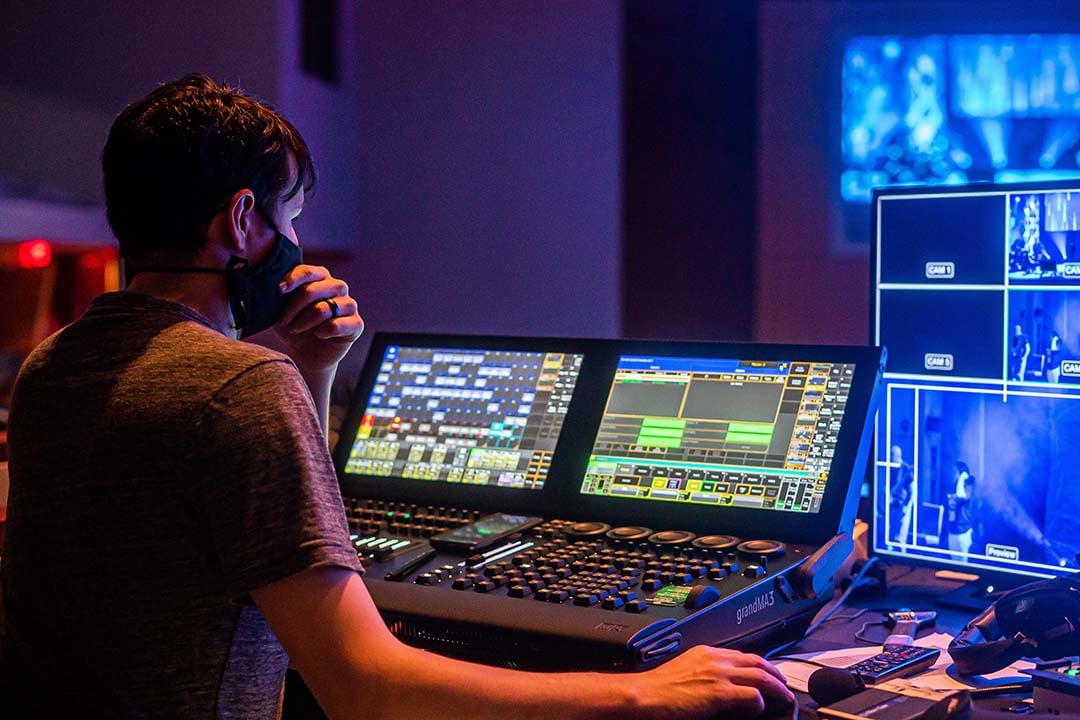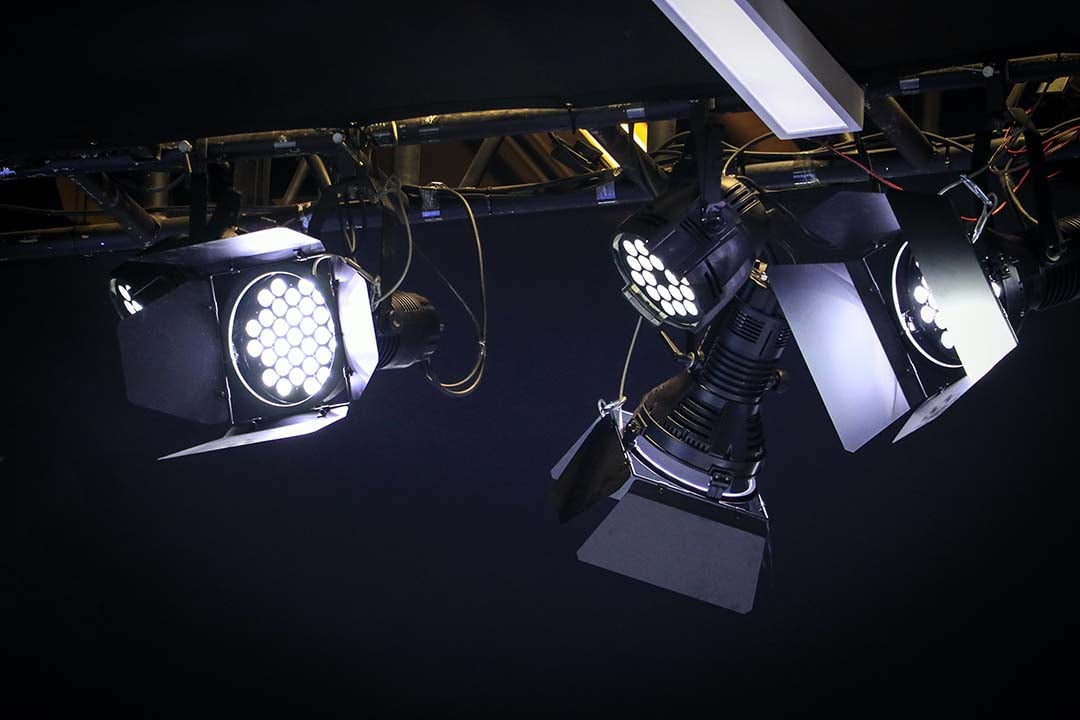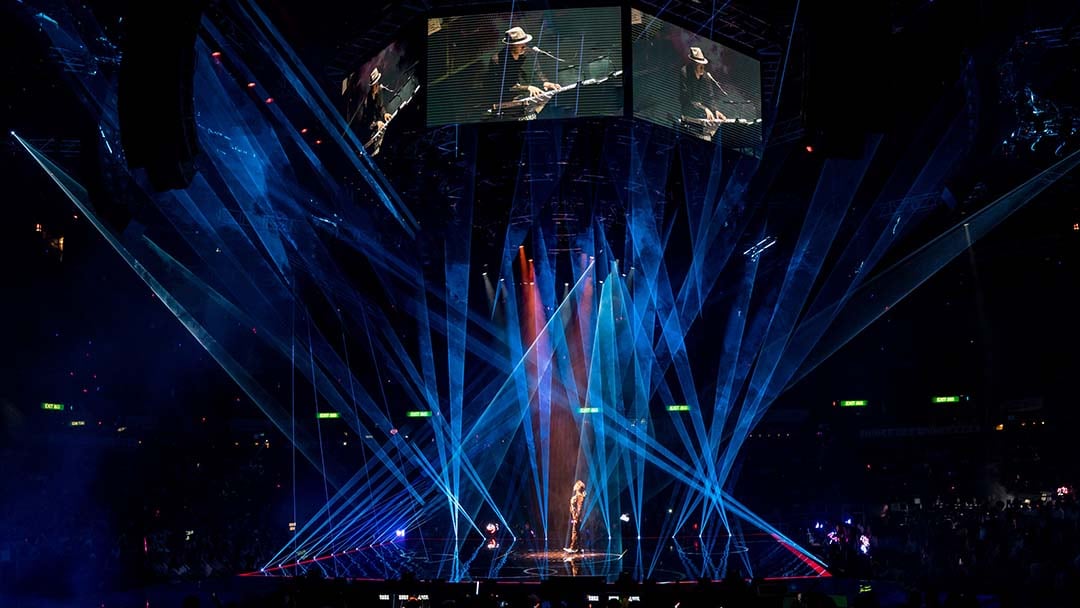You have probably seen great live performances from bands like Coldplay, Daft Punk, and U2. From dramatic spotlights to vibrant strobe effects, lights play a huge role in elevating the mood and impact of a live show. Lights dancing in tandem with music beats to spotlights following the performers and focusing on the audience - a live show without these is next to unimaginable!
Ever wondered who makes these stage performances come alive with light effects? A lot of it is done with the help of lighting engineers.
A lighting engineer or an L1 is in charge of controlling the lighting system at an event. Operating from their lighting console systems, L1s have to work tirelessly through events to ensure that the lighting system works flawlessly.

What is the role of an L1 leading up to an event?
Like most technicians involved in live productions, L1s have a lot on their plate leading up to an event. The lighting department engages different professionals if the live production is significant: the lighting director, the lighting technician, master electrician (ME), the follow-spot operators, the lighting programmer, and the L1.
In some cases, lighting engineers might collaborate with the lighting directors to make the shared vision of the event come to life. The lighting designer (LD) creates the concept, makes the original drawing and works with the L1 on how to implement on show sites.
Leading up to the event the L1 reviews to the drawing to make sure they understand the details and would then pass on the information to the master electrician (ME). The L1 and ME will work together in the timetable of how long will it take, what size crew is needed etc.
Apart from this, they suggest changes in light design based on budget constraints and the types of equipment required. The lighting department, the A/V department, and the production manager/technical director need to be on the same page about everything before preparations for the event can commence.
The various lights, lighting consoles, spotlights, rigs, and fixtures are tested by the L1s. Lighting engineers can recommend and change particular equipment for an event during this process. They also maintain an inventory for all the cables, wires, consoles, and other requisites.
Conducting dry runs or rehearsals before an event is a big part of a lighting engineer's job. Various things already decided in meetings (such as timings, positions, movements, light color, intensity, and temperature) are tested. Lighting engineers also program the lighting consoles to suit the event. Clear communication with others in the lighting department and the production team during these rehearsals are a must.
Check out a day in the life of these other positions:
What Does an A1 Do?
What Does a Video Engineer (V1) Do?

What does an L1 do during an event?
Lighting engineers have quite a few responsibilities during the event. Best case scenario when arriving on site is that the L1 will be given the lighting instructions/details on how to help make the event a success.
An L1 can be seen setting up or installing the required equipment on the day of the event. These include setting up the truss, cables, wires, power distribution, and the lighting console system. In addition, lighting engineers must ensure that all these are in excellent working condition before the event begins.
The L1 is the typically focusing the lights, programming the lights and running the console during an event.
If there is an assistant lighting engineer (L2), the L1 will oversee and instruct the L2 on equipment-rigging and power/signal distribution setup. After the equipment has been set up and the event starts, the L1 takes charge of the lighting console or the lighting board.
Of course, various problems with lights, signals, and wires can arise during an event, and L1s have to be quick in identifying and solving these issues. They are constantly communicating with other crew members in production teams, lighting designer, master electrician to solve technical issues during the event and ensure a proper live broadcast. More experienced L1s with a fair bit of technical knowledge can help other departments troubleshoot their problems during events.
💡You might like: Live Event Starter Guide

What does the L1 do after an event?
After the event, lighting engineers are responsible for packing and securely transporting the equipment. Again, the L2 and other technicians are assigned this work in case of larger events. If there is any damaged or lost equipment, L1s must report it to the production manager.
Attending the post-production or post-show meeting is essential for the L1 engineers. These meetings are where the L1s, A1s, V1s, and other relevant professionals discuss their observations regarding the event. The production team can then figure out areas that need improvement for the next event.
💡 Related: How To Advance Your Events Career Through Education & Training feat. Omar Colom
What do I need to become a lighting engineer?
A formal education, especially in electronics, can help improve your ability to grasp the technicalities of the work. Even if you have a relevant degree, you will not be catapulted to the top position of L1. Like most professionals in the live events industry, someone interested in lighting engineering will have to start at the bottom of the chain.
Such entry-level jobs include backstage assistance, production assistance, and junior lighting technicians. Once you gain experience and do your assigned job in the lighting department well, you can start applying for small gigs at the L1 level.
However, there are specific skill sets that help young professionals advance in the industry as an L1:
- You must have practical electrical knowledge. Prior knowledge of lights, lighting equipment, and rigging systems will help you rapidly transition to the L1 position.
- Knowledge about wires and signals is equally critical. Learning about the LAN and signaling works in a setup will help budding professionals solve issues quickly.
- Of course, being an L1 can be a challenging job. Handling heavy equipment and standing for extended periods all come with the job. You must be willing to work long hours and be physically fit.
- Learning about different light control consoles is crucial for someone just starting out in the lighting engineering domain.
- Basic knowledge of CAD (computer-aided design) software like Vectorworks can put you ahead of the curve. You can also educate yourself on simulation tools like AGi32 to calculate the lighting layouts.
- Having great teamwork and communication skills will also help you in this field. Stage productions or live events often consist of large teams, and the lighting engineers must have clear communication to ensure the smooth running of the event.
- Lighting engineers share a close association with lighting directors and set designers. Anyone aspiring to be an L1 must be adept at understanding and following lighting instructions.
- Studying and learning about other associated production teams like A/V can help aspiring lighting engineers up their worth in the industry.
.jpg?width=1080&height=720&name=2sam-moqadam-d1svyyw_9-s-unsplash%20(1).jpg)
How do I find lighting engineer (L1) jobs?
Developing your network is crucial to finding jobs in the live show industry. You have to proactively approach the backstage crew of live events to gain access to the behind-the-scenes work. Start with local productions and get a feel of how things work. You can work your way up to better and bigger shows through networking skills.
Working well with others and building relationships is also beneficial in this industry. There will people on the show sites that can recommend you for upcoming gigs so having a great reputation on site and get you far!
Updating your resume and putting them on job sites might lead you to potential gigs. You won't be getting the top job at the beginning in this industry. Entry-level jobs might be all that you find. Don't let this deter you! You should be willing to grind and put in a great shift, no matter the assigned job. A positive attitude is necessary for any potential lighting engineer to succeed in this industry.
Are you an experienced L1?
Join our Crew marketplace for access to jobs👇
